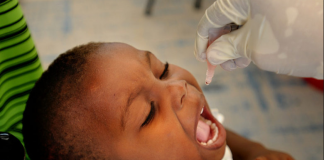

The national immunization campaign against polio in Somalia was officially launched Tuesday by WHO Representative in Somalia Dr Mamunur Rahman Malik and the Governor and Mayor of Mogadishu HE Omar Mohamed Mohamud Flish officially launched a national immunization campaign against polio in Somalia.
Deputy Special Representative of the Secretary-General and the United Nations Resident and Humanitarian Coordinator for Somalia Adam Abdelmoula was also present for Wednesday’s kickoff.
The group visited a camp for internally displaced persons in Manahijta and Waberi health centre in Banadir city, to officially launch the national immunization day and vaccinate children against polio.
The ongoing immunization campaign for polio targets close to 3.5 million children under 5 in the country, except Puntland and Somaliland. The first round of the campaign against polio was held in March and close to 95 percent of the 3.5 million children under 5 received an oral polio vaccine during the first round.
Somalia has remained free from the circulation of wild poliovirus since 2015. However, the country was affected by another type of poliovirus called circulating vaccine-derived poliovirus type 2 (cVDPV2). That particular strain began circulating in Somalia in 2017 and continues to cause paralysis and disability to a number of children in the country.
“The outbreak of polio caused by vaccine-derived type 2 and type 3 virus has led to permanent paralysis and disability to 32 children so far. This means that these children cannot run, walk or play as they should be able to,” Adam Abdelmoula, Deputy Special Representative of the Secretary-General and the United Nations Resident and Humanitarian Coordinator for Somalia said.
“Ending polio in Somalia and the rest of the world is a moral imperative for us. We aim for every child being born today to lead a healthy life and have equal access to health services. In this interconnected and globalized world, the threat of polio in one country is a threat everywhere,” he added.
The vaccine-derived poliovirus circulates in a setting where the routine immunization of childhood vaccination for polio is low and as a result, the immunity of children against polio remains low. The transmission of this new type of poliovirus is entrenched in the central and southern parts of Somalia, with spillover resulting in cross-border transmission in northern Somalia, Kenya and Ethiopia.
Inaccessibility is also a significant constraint to reaching every child in the country. There are some other compounding factors like regular population movement within and between the inaccessible areas and refugee camps in Somalia and neighbouring countries (mainly Kenya) that are pushing back progress.
“The main problem in not being able to stop the circulation of this type of poliovirus in the country is the inability of the fragile health sector to reach and vaccinate all children, especially the “zero-dose” children who have never been vaccinated and have no immunization shield to protect them,” Dr Sk Md Mamunur Rahman Malik, WHO Representative in Somalia said.
According to Malik, these national immunization days provide an opportunity to look for every last child and vaccinate them with an oral polio drop.
“We are hopeful that the country will be able to defeat this virus and the debilitating disease it causes by working together and making sure we use speed and precision to vaccinate all children targeted for such campaigns against polio and measles,” he added.